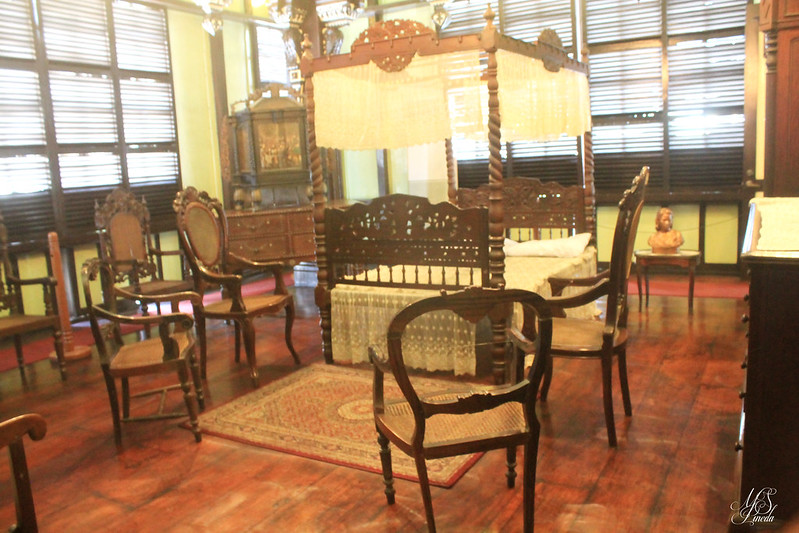
(Hover and click photo for complete and high-resolution photos of Pamintuan Mansion)
Don Mariano Pamintuan built this house, which was started around 1890. Together with his wife, Doňa Valentina Torres intended to give it as a wedding gift for their son, Don Florentino Pamintuan. It was however, not yet fortunately finished by the time Don Florentino married Doňa Mancia Vergara Sandico on 1895. In the later years, the couple finally settled in their finished home.
When the revolutionary army occupied Angeles around 1898, the house was used as headquarters of Gen. Venancio Concepcion. Later in April 1899, Gen. Antonio Luna used it as the general headquarters of the Filipino Army where he drew the plans for the defense of Pampanga against the American army.
On May 27, 1899, Gen. Emilio Aguinaldo moved into the mansion and made it as his headquarters and presidential residence. He was accompanied by his staff, including officers Gen. Luciano San Miguel and Gen. Gregorio del Pilar.
Gen Arthur Mc. Arthur and his staff made the house as their headquarters in 1909, following the victory of the Americans over the Filipino army.
The Pamintuan family finally resided on their house from 1902 to 1941 with a total of ten children born in the place to Don Florentino and Doňa Mancia, and later on, with his second wife, Doňa Tomasa Centeno.
A contingent of Japanese army cavalry occupied it on 1942, and served as a home to Kamikaze pilots. Later on, during the Liberation, the mansion was occupied by the 102nd Anti-Aricraft Brigade, and then, by the United States Services Organization (USO).
The house was bought by Don Pedro Tablante on 1959 and was leased by the Angeles City government to serve as a City Hall annex. Through the efforts of the Angeles City Historical and Cultural Committee, the Tablante Family donated the house to the Bangko Sentral ng Pilipinas in 1981. Restorations were made on 1983. On 1993 to 2009, the Pamintuan Mansion became the Regional Office of the Bangko Sentral ng Pilipinas. Through a memorandum agreement on 2010, the ownership of the mansion was transferred to the National Historical Commission of the Philippines, where it now serves as the Museum of Philippine Social History.
Excerpts from:
Angeles, Kasayasayang Lokal, Zaide Foundation
Singsing, Center for Kapampangan Studies
Museo Ning Angeles
When the revolutionary army occupied Angeles around 1898, the house was used as headquarters of Gen. Venancio Concepcion. Later in April 1899, Gen. Antonio Luna used it as the general headquarters of the Filipino Army where he drew the plans for the defense of Pampanga against the American army.
On May 27, 1899, Gen. Emilio Aguinaldo moved into the mansion and made it as his headquarters and presidential residence. He was accompanied by his staff, including officers Gen. Luciano San Miguel and Gen. Gregorio del Pilar.
Gen Arthur Mc. Arthur and his staff made the house as their headquarters in 1909, following the victory of the Americans over the Filipino army.
The Pamintuan family finally resided on their house from 1902 to 1941 with a total of ten children born in the place to Don Florentino and Doňa Mancia, and later on, with his second wife, Doňa Tomasa Centeno.
A contingent of Japanese army cavalry occupied it on 1942, and served as a home to Kamikaze pilots. Later on, during the Liberation, the mansion was occupied by the 102nd Anti-Aricraft Brigade, and then, by the United States Services Organization (USO).
The house was bought by Don Pedro Tablante on 1959 and was leased by the Angeles City government to serve as a City Hall annex. Through the efforts of the Angeles City Historical and Cultural Committee, the Tablante Family donated the house to the Bangko Sentral ng Pilipinas in 1981. Restorations were made on 1983. On 1993 to 2009, the Pamintuan Mansion became the Regional Office of the Bangko Sentral ng Pilipinas. Through a memorandum agreement on 2010, the ownership of the mansion was transferred to the National Historical Commission of the Philippines, where it now serves as the Museum of Philippine Social History.
Excerpts from:
Angeles, Kasayasayang Lokal, Zaide Foundation
Singsing, Center for Kapampangan Studies
Museo Ning Angeles
